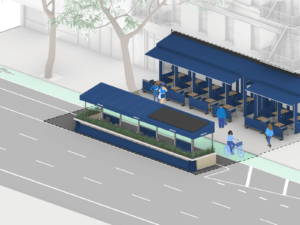In what can be interpreted as a sign that the social distancing measures instituted around the world over the past several weeks have proven effective, some of the largest temporary emergency treatment facilities erected to care for an influx of patients during the coronavirus pandemic are now discharging their final patients and shuttering their doors for the time being.
In London, the Independent reported that the NHS Nightingale Hospital London, one of several critical care hospitals across the United Kingdom operated by the National Health Service, is effectively closing up shop in the near future after admitting no new patients within the last week. As of this past Friday, medical workers assigned to the hospital were caring for 19 infected patients, down from a peak number of 35 in mid-April. Erected in just over a week within the cavernous halls of the ExCel London convention center, the field hospital opened at the top of April with 500 ventilator-equipped patient beds, with the capacity to accommodate up to 5,000 patients spread across 78 wards if needed.
NHS Nightingale hospitals in other English cities including Birmingham and Manchester have treated no patients during the course of the pandemic because, like in London, the intensive care wards of established hospitals, although unusually hectic, have not exceeded capacity as originally anticipated. These hospitals also opted to keep COVID-19-stricken patients within their own facilities instead of sending them to field hospitals due to the various services that the temporary NHS facilities lacked. Simply, the dreaded surge that the NHS anticipated never quite arrived.
Education and learning is a key focus at Nightingale London; making sure to not only enhance how we support patients and staff, but also to better prepare for the future. Here are some of our colleagues undergoing training before their first shift #Covid19 #NHSheroes pic.twitter.com/2n381ln0a9
— NHS Nightingale London (@NightingaleLDN) May 2, 2020
“As an initial idea, the Nightingale made a great deal of sense. The rationale for that is receding quite rapidly. We are having to think about what to do next,” an anonymous source close to the NHS Nightingale Hospital London told the Independent. “There are still patients and staff are still caring for patients but there have been no admissions in the past week. The numbers are going down.”
It’s unclear at this point what the ultimate fate of the NHS Nightingale London will be, although ExCel London certainly won’t be back in conventioneer-hosting action at any point soon. The Independent noted the NHS field hospitals would likely either be used as “step-down” facilities for patients in the midst of recovering from the deadly virus or temporarily closed altogether until a potential second wave of infections hits, which is certainly a possibility. To date, 28,446 lives have been lost to coronavirus in the U.K.
“We are still well above intensive care capacity in London overall,” the source explained to the Independent. “We don’t have a fully functioning NHS in London that is coping with strokes, cancer, heart disease, and coronavirus. If we mothball the Nightingale and need it again, standing it back up becomes that bit harder.”
While operations at the facility reportedly wind down, a spokesperson for the NHS makes clear that the “NHS Nightingale London will remain available to treat Covid-19 patients for as long as it is needed.”
In New York City, the Federal Emergency Management Agency (FEMA) has halted treatment operations at a temporary field hospital located within the Jacob K. Javits Convention Center on the West Side of Manhattan. A few dozen remaining patients were discharged from the 2,500-bed facility, which treated over 1,000 New Yorkers over the span of a month.
The temporary critical care facility at the Javits Center—along with three other military-run field hospitals in the greater New York area—will close but won’t be disassembled completely in the event of a second wave of infections per ABC News 7 NY. Although horrific stories and images continue to come out of New York City on a near-daily basis, the city is believed to have inched past the peak of coronavirus infections as hospitalization rates continue to decline.
The five boroughs remain the hardest hit area in the United States with 174,331 confirmed coronavirus cases and 18,925 deaths resulting from the virus as of writing.
“We are encouraged by the data which suggest the curve is flattening in New York and we are working with the city and state to begin the strategic drawdown of resources,” a spokesperson for FEMA told Gothamist in late April ahead+ of the field hospital’s closure. Another military-run emergency treatment facility based in Manhattan, the Navy hospital ship USNS Comfort, has also since departed the city. Hundreds of military medical personnel assigned to the Javits Center have since been redeployed to local hospitals or sent elsewhere.
In Seattle, an early domestic hotspot for the coronavirus, a 250-bed military field hospital built-out at a convention center was deemed redundant and closed before admitting any patients. The hospital was dissembled and its equipment was returned to FEMA for deployment to harder hit areas. Plans for pop-up critical care facilities in other cities were also ultimately scrapped due to the fact that local hospitals got close to, but never surpassed, capacity.











